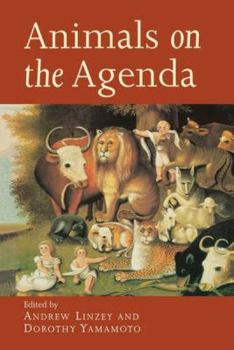Animals on the Agenda: Questions about Animals for Theology and Ethics
This encyclopaedic volume is the most comprehensive collection of original studies on animals and theology ever published. It tackles many apparently simple issues which raise fundamental questions about theology and how it is done, such as: Are animals part of a fallen creation? Do animals have immortal souls? How does God value animals? Does Christ's reconciling work include animals?
Format:Paperback
Language:English
ISBN:0334027322
ISBN13:9780334027324
Release Date:June 1998
Publisher:SCM Press
Length:318 Pages
Weight:1.00 lbs.
Customer Reviews
2 ratings
How should we think of animals?
Published by Thriftbooks.com User , 21 years ago
In 'Animals on the Agenda', Andrew Linzey and Dorothy Yamamoto have put together a good collection of essays and articles on the study of animals and theology. American and European contributors have come together to discuss questions that often perplex people from childhood onward -- do animals have souls? What is the proper attitude toward animals? Are they merely resources, or do they have rights? Much of theology divides the world into two classes -- creation and humanity; animals almost always get lumped in with the rest of creation, with little or no recognition of the sentient character of their being. Mainstream Christianity and Judaism still propagate ideas that are harmful to animals -- although, in the kosher laws of Judaism, respect of the living character of animals has always had a certain prominence, and more recently Christianity has dealt with the idea of animals as a valuable part of creation, worthy of respect and not merely exploitation by humanity. This book is primarily one of Christian theological perspectives -- I mention Judaism because many of the issues overlap, and many of the essays in this text will be informative for people of both traditions. This is not to say that the Christian or Jewish perspective must embrace vegetarianism, or suddenly convert to a radical elevation of the animal kingdom above that of humanity. While many Eastern religions have historically and theologically embraced what Westerners often consider an extreme point of view on animals, there is insight to be gained from them, as well. For 2000 years in the Christian tradition, and longer in the Jewish tradition, animals have had not only a low status, but often no status. 'Animals are subordinate to humankind, who have been given 'dominion' (commonly understood as despotism) over them. How far these ideas are distinctly or authentically Christian is beside the point; the fact is that the Christian tradition has propagated them--and still defends them.' Does an ethical sensitivity to animals represent a rejection of traditional theology? Many saints have been represented as having close, harmonious relations with animals (and not just St. Francis). It is true that most moral and systematic theologies have ignored animals, or relegated them to nothing more than a tool. Interestingly, Linzey states that the current state of theology is more open to the idea of aliens than to animals. In the speculation about possible life beyond the earth, some theologians already allow access to the divine. 'Such theological open-mindedness, not to mention open-heartedness, to other non-human alien species is hardly ever directed to other non-human but non-alien animal species.' This collection is very much a beginning. By looking at scriptural perspectives on animals in the Hebrew scriptures and the New Testament, church traditional perspectives (both catholic and protestant), examining disputed questions such as 'do animals have souls?' and 'what is the
A good summary of much-needed ideas about animals.
Published by Thriftbooks.com User , 24 years ago
I've grown very accustomed to defending the Biblically-based ideas of Andrew Linzey to those "Christians" who know little about God's Word and even less of His love and mercy, and this compilation is a wonderful addition to his impressive list of writings. This was the book that first introduced me to him, and others, in this fascinating field of Biblical thought. Highly recommended!





